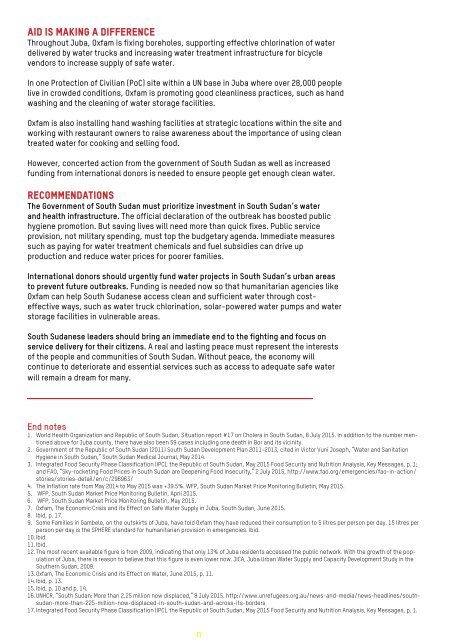Create successful ePaper yourself
Turn your PDF publications into a flip-book with our unique Google optimized e-Paper software.
Aid is making a differenceThroughout Juba, Oxfam is fixing boreholes, supporting effective chlorination of waterdelivered by water trucks and increasing water treatment infrastructure for bicyclevendors to increase supply of safe water.In one Protection of Civilian (PoC) site within a UN base in Juba where over 28,000 peoplelive in crowded conditions, Oxfam is promoting good cleanliness practices, such as handwashing and the cleaning of water storage facilities.Oxfam is also installing hand washing facilities at strategic locations within the site andworking with restaurant owners to raise awareness about the importance of using cleantreated water for cooking and selling food.However, concerted action from the government of South Sudan as well as increasedfunding from international donors is needed to ensure people get enough clean water.RecommendationsThe Government of South Sudan must prioritize investment in South Sudan’s waterand health infrastructure. The official declaration of the outbreak has boosted publichygiene promotion. But saving lives will need more than quick fixes. Public serviceprovision, not military spending, must top the budgetary agenda. Immediate measuressuch as paying for water treatment chemicals and fuel subsidies can drive upproduction and reduce water prices for poorer families.International donors should urgently fund water projects in South Sudan’s urban areasto prevent future outbreaks. Funding is needed now so that humanitarian agencies likeOxfam can help South Sudanese access clean and sufficient water through costeffectiveways, such as water truck chlorination, solar-powered water pumps and waterstorage facilities in vulnerable areas.South Sudanese leaders should bring an immediate end to the fighting and focus onservice delivery for their citizens. A real and lasting peace must represent the interestsof the people and communities of South Sudan. Without peace, the economy willcontinue to deteriorate and essential services such as access to adequate safe waterwill remain a dream for many.End notes1. World Health Organization and Republic of South Sudan, Situation report #17 on Cholera in South Sudan, 8 July 2015. In addition to the number mentionedabove for Juba county, there have also been 59 cases including one death in Bor and its vicinity.2. Government of the Republic of South Sudan (2011) South Sudan Development Plan 2011-2013, cited in Victor Vuni Joseph, “Water and SanitationHygiene in South Sudan,” South Sudan Medical Journal, May 2014.3. Integrated Food Security Phase Classification (IPC), the Republic of South Sudan, May 2015 Food Security and Nutrition Analysis, Key Messages, p. 1;and FAO, “Sky-rocketing Food Prices in South Sudan are Deepening Food Insecurity,” 2 July 2015, http://www.fao.org/emergencies/fao-in-action/stories/stories-detail/en/c/296963/4. The Inflation rate from May 2014 to May 2015 was +39.5%. WFP, South Sudan Market Price Monitoring Bulletin, May 2015.5. WFP, South Sudan Market Price Monitoring Bulletin, April 2015.6. WFP, South Sudan Market Price Monitoring Bulletin, May 2015.7. Oxfam, The Economic Crisis and its Effect on Safe Water Supply in Juba, South Sudan, June 2015.8. Ibid, p. 17.9. Some Families in Gambele, on the outskirts of Juba, have told Oxfam they have reduced their consumption to 5 litres per person per day. 15 litres perperson per day is the SPHERE standard for humanitarian provision in emergencies. Ibid.10. Ibid.11. Ibid.12. The most recent available figure is from 2009, indicating that only 13% of Juba residents accessed the public network. With the growth of the populationof Juba, there is reason to believe that this figure is even lower now. JICA, Juba Urban Water Supply and Capacity Development Study in theSouthern Sudan, 2009.13. Oxfam, The Economic Crisis and its Effect on Water, June 2015, p. 11.14. Ibid, p. 13.15. Ibid, p. 10 and p. 14.16. UNHCR, “South Sudan: More than 2.25 million now displaced,” 8 July 2015. http://www.unrefugees.org.au/news-and-media/news-headlines/southsudan-more-than-225-million-now-displaced-in-south-sudan-and-across-its-borders17. Integrated Food Security Phase Classification (IPC), the Republic of South Sudan, May 2015 Food Security and Nutrition Analysis, Key Messages, p. 1.


